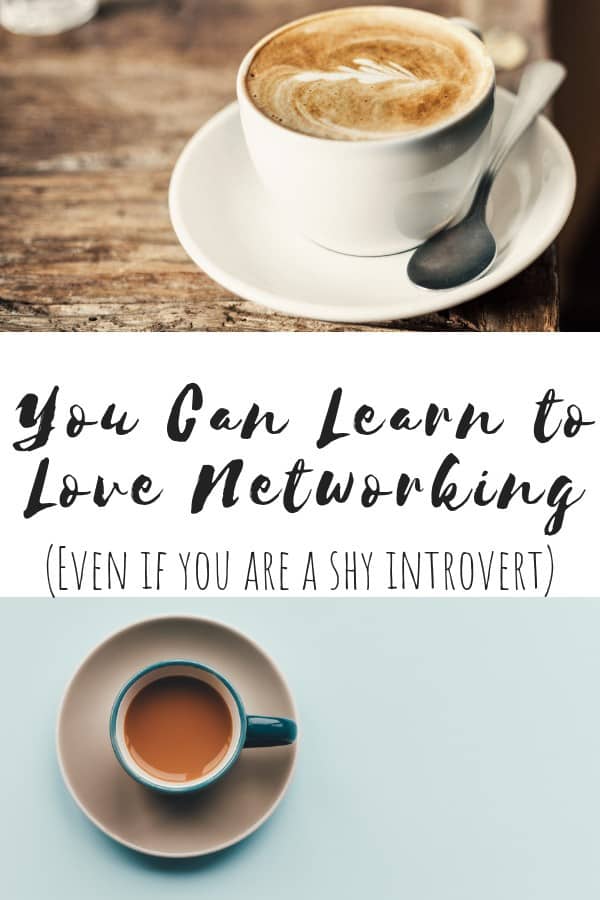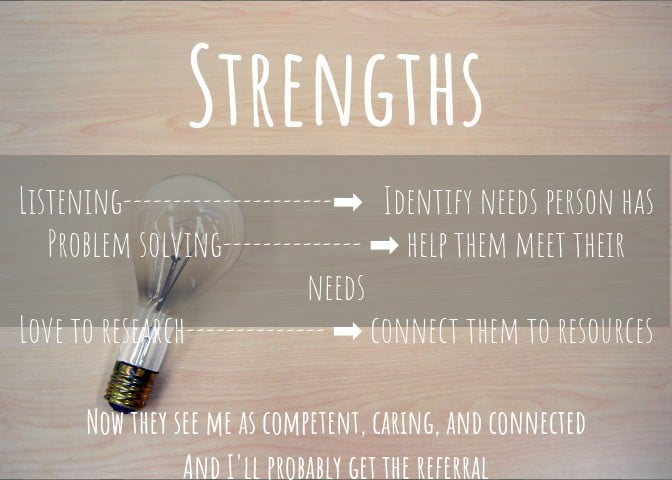
True or False? All shy introverts must hate networking?
If you said false I’m going to assume that you were trying to beat the system and you really think it’s true.
It’s not you, it’s me.
I have yet to meet a person who doesn’t think it’s crazy that someone as socially anxious as I am could possibly enjoy networking. It goes against the laws of nature, I hear.

I’m here to tell you, however, that it IS false! You might be thinking I’ve lost my marbles. While I may not have all my marbles, this isn’t where I lost them.
Zeus knows what I’m talking about.

I’ve heard networking referred to as a ‘necessary evil’ but I can attest that, while it is necessary to network in order to grow a profitable business, it doesn’t have to feel evil. We’ll get to that in a second.
Starting a business or climbing the corporate ladder are both built on networking. You’ve heard the old adage that you gotta know someone to get hired? That’s networking.
Alright, so you know you need to network but now the question is “how in the world do I enjoy it?” Well, two things. One–It’s easy to enjoy something you are good at. I’ll teach you how to get good. Two– I’ll show you my secret to using those skills and loving it.
The goal of networking is to increase your opportunities. You do that through sales, though if that feels like a dirty word you can think of it more as marketing or persuasion. I’ve learned that I can do that both directly and indirectly.
I think of direct marketing as your traditional networking where you meet someone and you try to talk yourself up. So, sales, basically. There’s a way to do this smoothly that doesn’t feel gross. Below, I’ll show you how.
I think of indirect marketing as more like branding–you’re establishing yourself as a leader in your field. You aren’t necessarily asking for the sale but making people think of you when they need a service you provide. There are some great psychological principles that can be used here.
Direct Marketing:
I’ve used these strategies to get business from others in my same field even when we are technically “competing” for business. This works well in the service industry but may also work in other fields. Using this strategy, I’ve developed solid working relationships–one does almost as much marketing for me as I do for myself ?

Who You Network With is Important:
?Invite people to meet with you who compliment your business. It’s easier then to focus on how you can help each other and feel more like collaboration than competition
Some Important Opening Strategies:
?The whole conversation doesn’t have to be business related. It’s a success if most of the conversation is getting to know each other and only a portion is about work. Ultimately, we like working with, referring to, promoting people that we connect with.
? Focus on asking the other person about their own work, showing interest in them. Focus on ways that you compliment each other and how you could possibly be helpful to them. Basically, start by making the conversation about the other person. This keeps it from feeling like you’re a used car salesman who only cares about what they can do for you. It helps you feel less anxious and it helps the other person feel connected.
How to Sell Yourself Effectively:
?Present yourself to meet their needs only when you meet their needs well. If you don’t, recommend another person/business who meets their needs well because then you are meeting their need and they begin to see you as the “go to” or expert. Also, when you do this, they know you are marketing for them and they are more interested in marketing for you. If you are an employee, you might focus on trying to connect that person to someone who might be helpful toward their goals.
?When you are ready to present yourself, use an elevator pitch. It’s a good idea to have this ready and practiced ahead of time so it doesn’t feel so uncomfortable in the moment. Never build yourself up by tearing another down. Especially not here. They will wonder what you tell people about them. My elevator pitch was something along the lines of “I focus on treating people who have been sexually abused or faced other traumatic events, using EMDR and I work in (my area).” From there, they usually start asking questions to learn more about me.
A Note on Large Event Networking:
?If you are at a large event, focus on one person at a time or at most a small group which allows you to build stronger connections. If you prefer other introverts, gravitate toward those looking as uncomfortable as you may feel (at first) or if you prefer talking with extroverts who are able to keep the conversation going easier, look for the one who seems to be talking to everyone. Then, apply these same strategies.
How to Ask for More:
?Ask for contact info/business card. When I network with family therapists, I always mention something like “It’s always nice to have these when I get someone who I know needs family work.” That way they know you have the intention of passing it along. Doing so makes them more interested in asking for your card and passing it along as well.
Indirect/Branding:
I’m seen in my field as being the one with all of the connections. I used the direct sales techniques above to meet a ton of people and then make myself available to help my colleagues find those resources when they need it. This has led to me being seen as the “go-to” and it has served me well.
I also started and hosted training and specific networking events for a niche area of my field which led to me being highly associated with that area of need, even though I’m not the most experienced person who does what I do. I offered to meet up with other people in my industry who are interested in an area that I know a lot about and to answer any of their questions. Even though I did this for free and I’m giving my “secrets” to my competition, it established me as a leader and I’ve gotten a lot of referrals from doing this. It’s counter-intuitive but has worked really well.
By doing these things, I made my colleagues associate me with a particular skill and when they need that skill or someone else needs that skill, I’m the one they recommend. Even if they now do what I do, I’m the one they recommend if the work is outside of their skill level.
Keep these practical points in mind–they are vital for the introvert in business, heck–for ANYONE is business. BUT there’s something more that has really helped me to navigate these points without so much anxiety. It’s been the key for me in learning to enjoy networking, despite being highly introverted and socially anxious. Are you ready for it? Well…
➡I get into character.

I know, it sounds crazy, overly simplistic, disingenuous..but it isn’t.
When I’m networking, I play up the part of my personality that connects well with other people, that cares about other people, and enjoys helping other people. I tone down the part that is shy or anxious or introverted. I can almost feel your question burning…How the heck do you do that?
I do that by getting into character. Yes, I mean that I do that by acting. The career or business side of us has certain expectations, a certain role that we are expected to play. When an actor is handed a role for a movie or a play, they are expected to take that role, stay in the required expectations, and then make it their own. That’s what I’ve done.

That career/business side of us is expected to make connections, to show competence and confidence without falling into arrogance. That role expects that we believe in our product, service, skill…that we believe in ourselves. Even if you struggle with that in another part of your personality, when you are in this role, you get to fully embrace your selling points.
Here it can be helpful to identify the part of you or your work where you feel most competent and then practice selling that using the strategies above. I felt good about my EMDR training and it became easy to sell that to people. If I’d been trying to sell that I was the best in the business I wouldn’t have felt as confident and it probably wouldn’t seem as smooth or natural as it does.
Selling yourself doesn’t have to be…icky. It can be easy and smooth. Here’s a good example. Perhaps, one of the only good examples Michael Scott can provide ?⬇
This skill isn’t about pretending to be something you aren’t and it’s not about mimicking the social skills of the most outgoing person in the room. It’s about playing to your own strengths. One of my strengths is my ability to do creative problem solving (being that resource to others) so when I’m asking another business owner about their needs, this gives me an opportunity to use my strength in a way that benefits my reputation.
You need to identify where your strengths lie and develop a character that emphasizes those positives while fulfilling the expectations of the role.

I don’t expect myself to be the most outgoing person in the room. That would definitely be disingenuous to my personality, but I do push myself to be a bit more social than I would otherwise be. I push myself to talk to new people, even if it’s just to say “I really love that sweater! Where did you get it?”
I promise you, I’m not the person who pretends I’m shy and is really outgoing. I’m just like you–maybe worse sometimes. If you’ve read my Dog Magic post, you’ll know that making friends and being social or outgoing comes really hard to me.
AND YET, this getting into character strategy has helped me to love networking. It has worked for me. The Mister saw me in a networking situation and was so shocked by how outgoing and confident I seemed that he said he had to do a double take just to make sure it was really me ?
It takes some trial and error, but it works. Give it a try. When you realize that you can actually be good at networking, its easy to decide that you love it–or at least don’t hate it.
Need some extra support in applying it to your life? Leave me a comment and we’ll help you sort it out ?
LOVE THIS! While i am huge extrovert and do not typically have a hard time. I loved reading “get into character” there have been times where I talk myself out of “knowing what I’m talking about” I will definitely pass this along!
So glad you liked it Brittany! You know, it seems like networking can really be uncomfortable no matter what your personality type is–introverted, extroverted, timid, bold, etc…because it hits out confidence in ourselves and then our ability to sell that to others in an effective way. For some reason that I can’t explain exactly, the getting into character bit just really helps me with that ? When you try it, let me know how it goes!